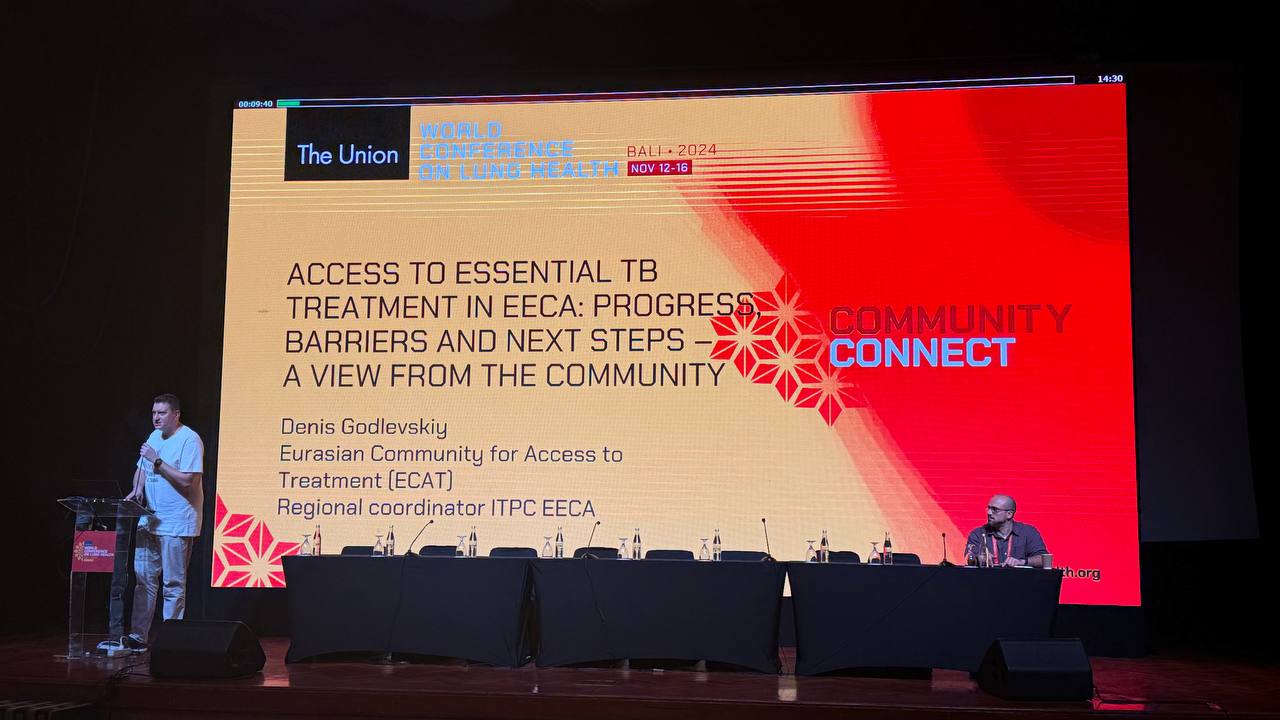The International Treatment Preparedness Coalition Eastern Europe and Central Asia (ITPC EECA) is working to prevent the TB Alliance from obtaining an evergreening patent that could potentially be limiting access to treatment for drug-resistant tuberculosis (DR-TB). ITPC-EECA has filed pre-grant oppositions with the Eurasian Patent Office (EAPO) to stop three evergreening patents from being granted in EECA region: one on the combination of bedaquiline, pretomanid and linezolid (BPaL), and two for the granule and amorphous forms of pretomanid – which is an essential part of World Health Organization (WHO)-recommended treatment for DR-TB. If granted by EAPO, these low-quality patents will potentially extend TB Alliance monopoly on pretomanid until 2047.
According to WHO, 400,000 people developed DR-TB in 2023, yet only 44% (175, 923) of them were treated for it. Improving affordability of and access to WHO-recommended DR-TB treatment is urgently needed to prevent onward transmission, illness, suffering and death.
The all-oral BPaL regimen is recommended by WHO for adults with DR-TB, and included in the WHO 2022 guidelines for the treatment of MDR-TB. BPaL is a significant improvement over the 18 to 24 month regimens used in the past for DR-TB, which were less effective and included thousands of pills and painful injections that caused severe side effects, including permanent deafness.
TB Alliance, a non-profit organization researching TB treatment, applied for the three patent extensions in 2016, 2020, and 2022. If successful, TB Alliance’s patent would be extended an additional 20 years (with an additional possible 5-year extension). This would keep these drugs under a monopoly, preventing price-cutting generic competition and wider access, until at least 2026, 2040, and 2042, respectively.
The EECA region is home to 24% of the world’s DR-TB burden, and 47% of extensively drug-resistant TB, making access to effective treatment an urgent priority. “ITPC believes that granting these patents will drive drug prices up, and limit access for millions of people in EECA,” stated Maria Shibaeva, treatment access legal specialist at ITPC-EECA.
Pharmaceutical companies have long been criticized for unreasonably high prices of TB medication, limiting access to these drugs. Humanitarian organization Doctors Without Borders/ Médecins Sans Frontières (MSF), one of the largest non-governmental providers of TB treatment in the world, has previously called out big pharma for its exorbitant pricing of game-changing TB drugs, saying that these companies “put their profits over people’s lives.”
According to research, competitive large-scale generic manufacturing of DR-TB drugs could lower prices, allowing countries to treat 5 to 10 times more MDR-TB cases within current procurement budgets. But a patent extension would limit generic manufacturing, excluding millions of people with TB from accessing treatment.
The exclusive rights granted by a patent would limit competition, leading to higher prices and reduced availability of pretomanid. According to ITPC-EECA’s patent opposition, pretomanid is a known substance with predictable properties, and it does not meet patentability criteria. Since this patent application lacks novelty, it should not be approved by EAPO. We urge EAPO to reject these patent applications, and take steps to ensure that patent extensions on these life-saving drugs are not granted in order to ensure greater access,” said Shibaeva.
ITPC-EECA underscored that TB Alliance relied upon public funding to develop pretomanid, so it should be accessible to all who need it. Unlike typical cases with pharmaceutical companies seeking to extend their patents, TB Alliance is a non-for-profit organization, which has alarmed public health advocates, who state that the organization’s actions contradict its mandate.
“Since pretomanid was developed with public money, it should be available to all patients in need. The TB Alliance is a non-profit organization that should not take the same patenting approaches as pharmaceutical companies. We urge TB Alliance not to exercise any intellectual rights ownership of the drug,” said Shibaeva. “This is the only way we ensure that people living with TB — especially those who are intolerant to other treatments — can have access to this game-changing treatment.”

